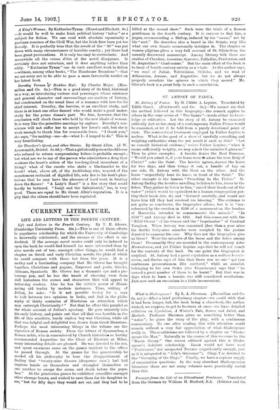ST. ANTONY OF PADUA.
St. Antony of Padua. By M. l'Abbei A. Lepitre. Translated by Edith Guest. (Duckworth and Co. 3s.)—We cannot see that the method followed in this biography—the remark applies to others in the same series of "The Saints "—tends either to know- ledge or edification. Let the story of St. Antony be examined critically just as the story of a contemporary Italian Prince would be examined, or let it be told from a purely devotional point of view. The semi-critical treatment employed by Father Lepitro is useless. What is the good of a show of carefully consulting and weighing authorities when the net result is such as this? "Let us consult historical evidence," writes Father Lepitre ; "when it seems sufficiently weighty, we may admit the miracles it gives us." Then he gives examples. A heretic denies the Real Presence. "Would you admit it, if your horse were tto adore the true Body of Christ ? " asks the Saint. The heretic agrees, starves the horse for two days, and then brings it out, a bwidlo of hay on one side, St. Antony with the Host on the other. And the horse "respectfully bent its knees in front of the Saint." The other example is the famous "Preaching to the Fishes." St. Antony finding the heretics unwilling to listen to him, turns to the fishes. They gather to listen to him, "raised their heads out of the water" (which would be equivalent to a human congregation put- ting their heads into it), and "listened carefully, and would not leave him till they had received his blessing." The evidence is not quite so conclusive, the biographer allows, but it is "cor- roborated by the erection in 1559 of a monument on the borders of Marecchia intended to commemorate the miracle." "In 1559"! and Antony died in 1231. And this comes out with the "Nihil Obstat " of the Censor and the " Imprimatur " of Cardinal Vaughan. When Antony was canonised (less than a year after his death) forty-nine miracles were accepted by the prelate deputed to examine the case. Why does not the biographer give us these ? Were the miracles of the horse and the fishes among them? Presumably they are recorded in the contemporary Liber Miraculorum, and yet Father Lepitre says that he will not vouch for the contents of this book. On one point the biographer is sceptical. St. Antony had a great reputation as a stalleus haereti- coruni, and Surius says of him that there was no one " qui tam continuam persecutionem ilhis excitaret," while an annalist belonging to his own Order (the Franciscans) says that "he caused a great number of thorn to be burnt." But that was in days when to burn a heretic was still considered meritorious. Just now such an encomium is a little inconvenient.










































 Previous page
Previous page